BREAKING! 2ND BATCH OF FAUCI E-MAILS: INVITE TO ROCKEFELLER’S TRILATERAL COMMISSION
There’s no way the intelligence communities from at least 4-5 countries didn’t know of this. Not acting on it is participating in it.


https://embed.documentcloud.org/documents/20793561-leopold-nih-foia-anthony-fauci-emails
This is an official FOIA release obtained by Jason Leopold, Buzzfeed contributor. His article on this is below, but first I want to raise an eyebrow, because the sender of the e-mail is this semi-notorious pro-Ivermectin militant who you wouldn’t expect to have this conversation with Fauci, would you? But there he is.
LATER UPDATES:
FAUCI PROPOSED ZUCKERBERG’S BIOTECH FIRM TO INVESTIGATE THE SARS-COV-2 ORIGINS. BECAUSE THE PEOPLE THERE ‘ARE PAYING SPECIAL ATTENTION TO THE WUHAN STRAIN’. IN FEBRUARY 2020!

Digging through Fauci’s e-mails is bad for your teeth and liver, I should stop

Apparently, this needs explained:
The e-mail above single-handedly proves the lab-leak suspicions are as old and based as the virus.
The guy who sent the e-mail above, later published this:
A second statement which had enormous influence in shaping public attitudes was a letter (in other words an opinion piece, not a scientific article) published on March 17, 2020, in the journal Nature Medicine. Its authors were a group of virologists led by Kristian G. Andersen of the Scripps Research Institute. “Our analyses clearly show that SARS-CoV-2 is not a laboratory construct or a purposefully manipulated virus,” the five virologists declared in the second paragraph of their letter. – The Wire
Here’s the Buzzfeed report, mostly useless trash not worth your time, but for some context:
Anthony Fauci’s Emails Reveal The Pressure That Fell On One Man
Thousands of pages of communications obtained by BuzzFeed News show how Fauci tried to keep Americans calm and develop an effective strategy despite conflicts with the Trump administration. Natalie Bettendorf BuzzFeed Contributor Jason Leopold BuzzFeed News Reporter
Posted on June 1, 2021, at 1:59 p.m. ET
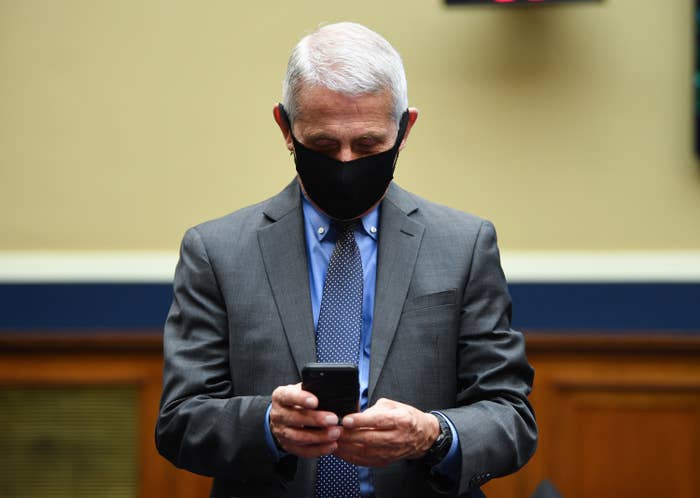
The woman’s email arrived in Anthony Fauci’s inbox on Feb. 28, 2020, with a one-word subject line: “URGENT.”
The coronavirus crisis was still in its early stages, and Fauci, the US government’s top infectious disease scientist, was already under tremendous pressure, both because of the health threat facing the country and the political climate fostered by the Trump administration.
“I understand Vice President Pence has ordered you to not inform the public about Coronavirus without approval. This is quite terrifying, especially since Trump has already shown his desire to spread false or incomplete information about this public health crisis,” the woman wrote.
She had tracked down Fauci’s email, which is not easily accessible on government websites, because she had a pressing question: “I’m planning to fly domestically TOMORROW [REDACTED]. Is it safe??”
Of course, Fauci had urgent matters of his own to attend to, but he replied to the stranger anyway the next day. “There is much misinformation,” he wrote back. “I actually have not been muzzled at all by the Vice President. And BTW, it is safe to fly domestically [REDACTED].”
More than 3,200 pages of emails obtained through a Freedom of Information Act lawsuit filed by BuzzFeed News — covering the period from January to June 2020 — provide a rare glimpse into how Fauci approached his job during the biggest health crisis of the last century, showing him dealing directly with the public, health officials, reporters, and even celebrities. (The Washington Post also received more than 800 pages of emails and published a story about them on Monday.)
The emails reviewed by BuzzFeed News reveal him sparring over an antiviral drug with Ezekiel Emanuel, a former Obama administration health adviser, fielding questions about vaccines, and receiving an update from Mark Zuckerberg on Facebook’s plans for a coronavirus “information hub.” Zuckerberg also asked whether the social media company could provide resources to accelerate vaccine testing. And Fauci even responded to an offer from actor Morgan Fairchild to use her Twitter account on his behalf.
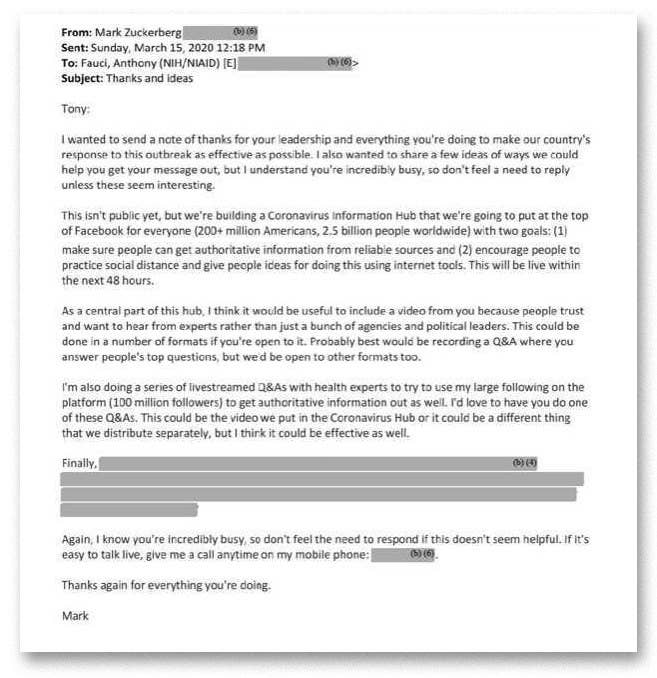
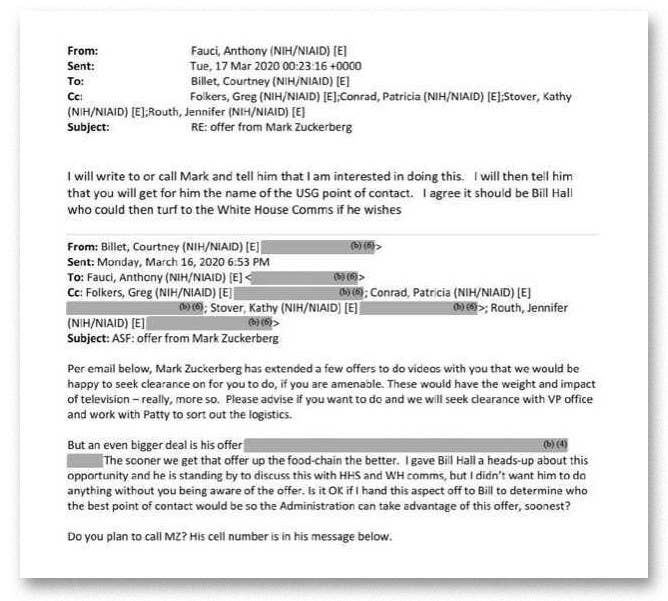
“It would be great if you could tweet to your many Twitter followers,” he responded to Fairchild. “The American public should not be frightened, but should be prepared to mitigate an outbreak in this country by measures including social distancing, teleworking, temporary closure of schools, etc.”
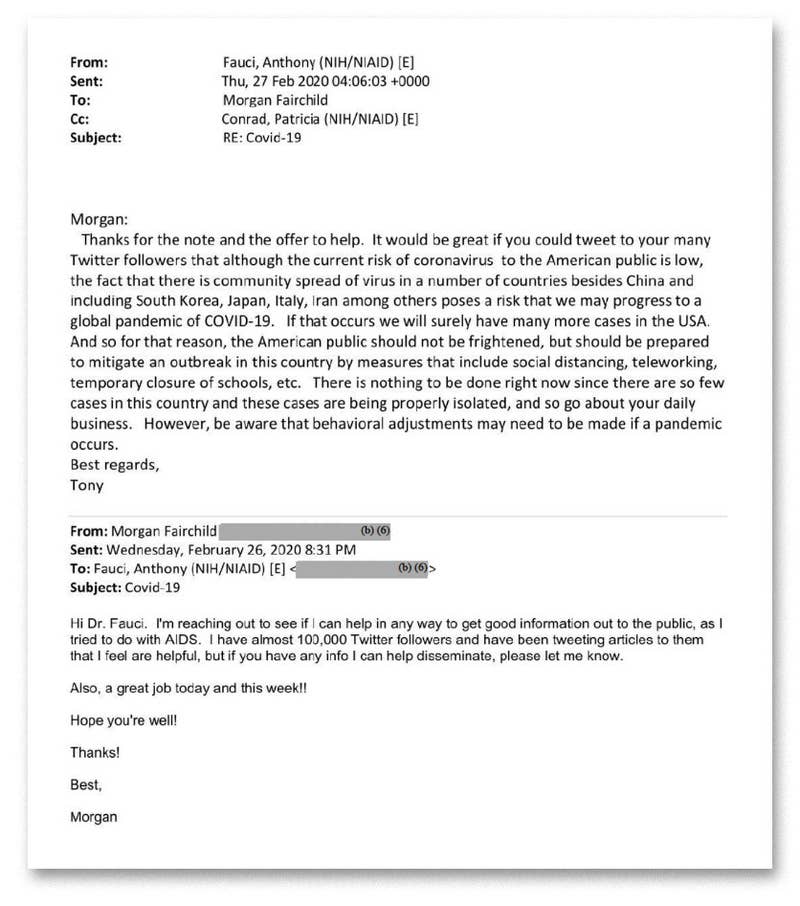
The emails show Fauci received a flurry of correspondence about the theory that coronavirus leaked from a lab in Wuhan. One such email sent to Fauci on April 16, 2020 by Francis Collins, the director of the National Institute of Health, under the subject line “conspiracy gains momentum” contained a link to a news story highlighting a Fox News report that said the allegation had merit. Fauci’s response to Collins is entirely blacked out.
The records also lay bare Fauci’s ambivalence toward his newfound celebrity status but also his embrace of a documentary crew who would tell his story. Additionally, the emails hint at the personal toll this past year has taken on him. In one email sent on Feb. 18, weeks before COVID-19 was declared a global pandemic, he wrote that he had only been able to see his wife for 45 minutes in the previous 10 days.
Fauci, who has been director of the National Institute of Allergy and Infectious Diseases since 1984, declined to comment for this story.
Some of the emails were reviewed by the Trump White House before being turned over to BuzzFeed News. They represent just a portion of what was requested, and they are filled with redactions, making them an incomplete record of the time period and Fauci’s correspondence. Additional tranches are expected to be released in the coming months.
However, the emails do give a sense of the type of communicator Fauci is: courteous, low-key, and empathetic. He politely interacts with the office assistants who help him with his correspondence, and he sweats over the proper way to let people down.
When a White House fellow and physician emails Fauci and offers to team up to write an opinion piece on the coronavirus and “unite the nation,” the NIAID director asks a colleague, “How do we nicely say no to this person?”
And when health professionals write him with harsh criticism of Trump’s handling of the pandemic, he doesn’t take the bait. Instead, he replies with a “thank you.”

His tone is a mix of friendly and formal, employing phrases like “let us discuss,” “many thanks,” and — in rare displays of displeasure — a delicate “yikes!” He signs off as “Tony.”
Even though he tends to sidestep controversy, Fauci does defend his decisions and push back.
In March 2020, Fauci and a few other colleagues received an email from Gregg Gonsalves, a prominent Yale School of Public Health epidemiologist, urging the NIAID director and his team to act promptly on the virus. The subject line was “We Are Desperate for Advice.”
“For those I know, I don’t doubt your commitment to public service,” Gonsalves wrote. “But time is running out. We need vocally, unequivocal leadership now, that offers real guidance to communities about what to do, what might happen next.”

Fauci clearly resented any implication that his health team’s response was being shaped by the political values of the Trump administration, and he responded curtly three hours later.
“Gregg: I am surprised you included me in your note,” he wrote. “I genuflect to no one but science and always, always speak my mind when it comes to public health. I have consistently corrected misstatements by others and will continue to do so.”
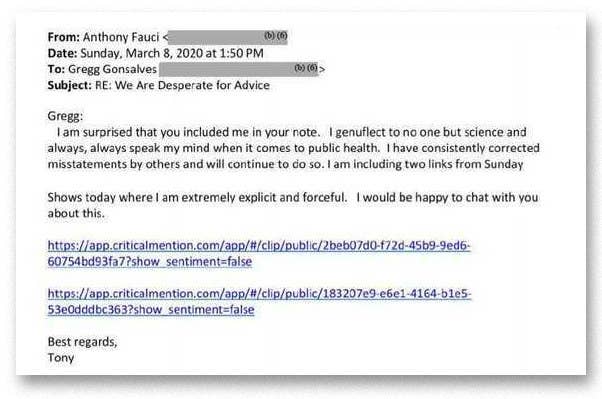

Fauci, 80, has tackled the world’s most difficult health crises and infectious diseases, such as HIV/AIDS, Ebola, and Zika, earning respect in his field and the trust of many Americans. As the COVID-19 crisis deepened, his inbox filled with queries from people seeking guidance, solace, or morsels of medical advice.
On March 4, under the subject line “A humble request for your wisdom,” a woman wrote to Fauci and asked whether a person inoculated against pneumonia would be protected against COVID-19.
One hour later, at 9:45 p.m. on a Wednesday, Fauci replied that complications from COVID-19 are “heavily skewed” toward people who are older or have underlying conditions. He went into a lengthy explanation:
“Most of the pneumonias are pure viral pneumonia and so this vaccination will not help that,” he wrote. “However, on the chance that you have a pure viral pneumonia that gets secondarily complicated by a bacterial pneumonia (pneumococcal) the vaccine would be beneficial.
“If you are 65 years of age or older, you should get pneumonvax23 anyway regardless of the risk of coronavirus infection. Thanks, Tony.”
Five minutes later, the woman wrote back, “Oh my god. … I honestly never expected you to reply and I thank you from the bottom of my heart for being so generous!”
Some writers emailed mainly to vent. Among them: a Florida infectious disease specialist who was upset that some Americans were not taking proper precautions.
“I am putting my life on the line so folks can go pump iron, drink beer, have a burger and get a tan,” Doug Brust emailed Fauci on March 18.
“The band is playing on. Again,” Brust wrote, a reference to one of the most famous books of the AIDS epidemic, And the Band Played On, which exposed the hapless efforts of the government and the public medical establishment to address the health crisis.
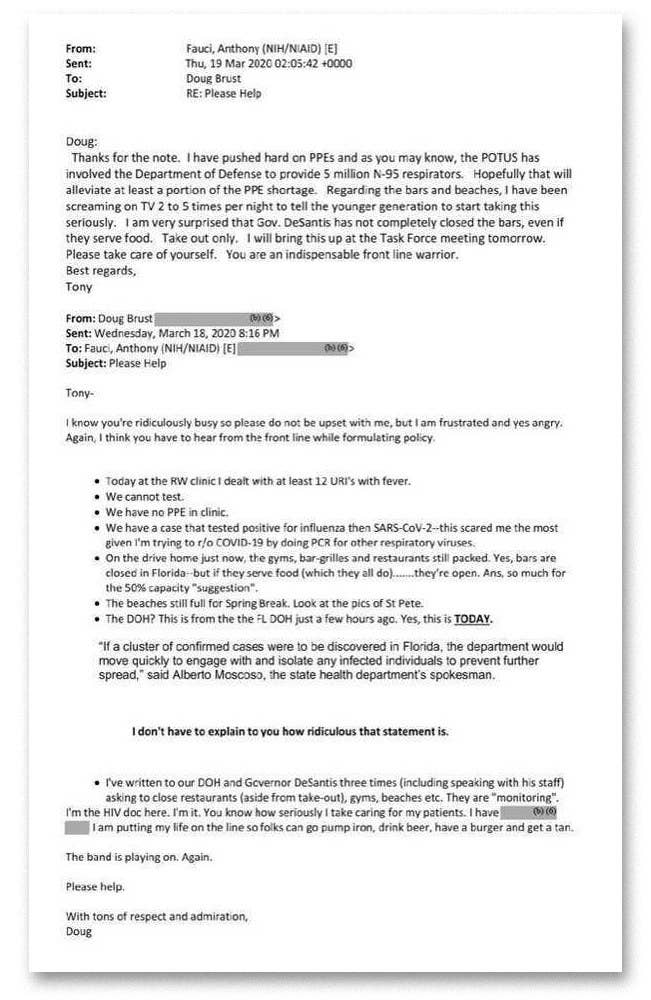
And reporters, of course, reached out with questions for the doctor considered the country’s foremost expert. One email exchange, however, shows how even Fauci couldn’t see all that was coming.
Just a day after the first reported COVID-19 death in the United States, the managing editor of ABC News’ medical unit emailed Fauci and asked him if he agreed with what a source at the Department of Homeland Security told him: that epidemiology models showed that 98 million people could be infected with COVID-19 and deaths from the virus could reach 500,000.
“That seems exceptionally high,” Fauci responded.
His guidance was not always welcomed by his own bosses at the White House. He faced a wide range of harassment, including angry tweets from Trump that questioned his expertise.
Those conflicts also get referenced in the emails. In April, a top Chinese health official emailed Fauci about vaccines. As part of that thread, the official expressed concern about him “being attacked by some people.”
“Thank you for your kind note. All is well despite some crazy people in this world,” Fauci replied.
Even as he gained enemies and roused critics, many of the emails also reflect his growing stature around the world.
“Dear — highly respected — Dr. Fauci,” a doctor from Austria writes in bolded text. “Why do I try to childishly support a respected expert and personally highly honored Gentleman like you — Dr. Fauxi? Because for me — it is heartbreaking and unbelievably disturbing, what was and is going on of the last 4 months in the USA.”
He goes on to lay out a strategy for nations to cope with the devastating effects of the pandemic.
“Not a crazy note. Please respond on my behalf,” Fauci writes to a staff member.
On May 5, 2020, Mary Harris, an NIAID employee, wrote: “I am grateful to say my Director is Dr. Anthony Fauci and share with my family, friends, and church that if you said it, it’s gospel.”
Along the way, the scientist was becoming a celebrity. Just a couple of months into the pandemic, T-shirts, bobbleheads, socks, and even prayer candles with his face plastered on them were being sold. Fauci’s emails show he was clearly uncomfortable with the attention.
“Click on the ‘Cuomo Crush’ and ‘Fauci Fever’ link below. It will blow your mind. Our society is really totally nuts,” Fauci wrote in an April 8, 2020, email he forwarded to undisclosed recipients after he received a Google alert about news stories mentioning his name.
The previous month, a colleague had emailed Fauci a Washington Post article headlined “Fauci Socks, Fauci Doughnuts, Fauci Fan Art: The Coronavirus Experts Attract a Cult Following.” The top of the article tells the story of a Rochester, New York, shop that had sold out of donuts with Fauci’s face on them.
“Truly surrealistic,” Fauci wrote. “Hopefully this all stops soon.” Later, he added: “It is not at all pleasant, that is for sure.”
But it didn’t stop, and, at times, Fauci actually couldn’t help but get a kick out of it, including when Brad Pitt played him on Saturday Night Live.
“One reviewer of the SNL show said that Pitt looked ‘exactly like me.’ That statement made my year, ” Fauci wrote to a colleague.
The emails also reveal behind-the-scenes negotiations over a documentary about Fauci’s work. He first sent a note to his team about the project on April 12, a month after the World Health Organization had declared the coronavirus a pandemic.
“Let us discuss this tomorrow before we do anything. No one has any ‘exclusives’ on anything about me,” he wrote to his team.
Still, there is little in his correspondence that strays from the central issues: the pandemic and how best to save lives. His exchanges with Ezekiel Emanuel, the former Obama health adviser, reflect the high stakes.
Emanuel, an oncologist, bioethicist, and vice provost of the University of Pennsylvania, sent Fauci an email on Feb. 25, 2020, asking for an updated assessment of the virus and noting that he was having a “hard time seeing this as serious as everyone else.”
“Am I blind? Yes very transmissible but low mortality like flu in many ways – the elderly, those with comorbidities, and total impact is likely to be less than flu,” Emanuel wrote.
Later, in April, Emanuel sent Fauci an email saying he was “perplexed” by his “seeming strong endorsement” of the antiviral drug remdesivir to treat COVID-19.
“Was it just a bit forced?” Emanuel asked. “My reading was the data was weak and in normal times for normal disease it is not enough to approve. And very unlikely to really impact COVID-19 disease pattern–regardless of supply issues.”
Fauci countered: “I did not ‘strongly’ endorse it. I specifically said it was not a knockout drug and was only a baby step in the direction of developing more and better drugs. I said that it was important because it proved in a well-powered, randomized, placebo-controlled clinical trial that one can suppress the virus enough to see a clinical effect, as modest as the effect was. I do not think I forced anything.”
The next day, Emanuel sent another email, apologizing for misinterpreting Fauci’s comments about the drug and inviting him over for dinner “on the porch.”
“You are a national — international — treasure. And we are depending on your sanity and smarts.”
To be continued?
Our work and existence, as media and people, is funded solely by our most generous supporters. But we’re not really covering our costs so far, and we’re in dire needs to upgrade our equipment, especially for video production.
Help SILVIEW.media survive and grow, please donate here, anything helps. Thank you!
! Articles can always be subject of later editing as a way of perfecting them

You can even eat some of them.
CLICK HERE

